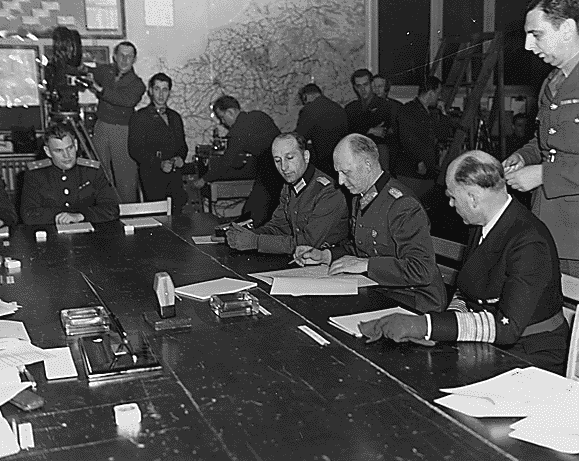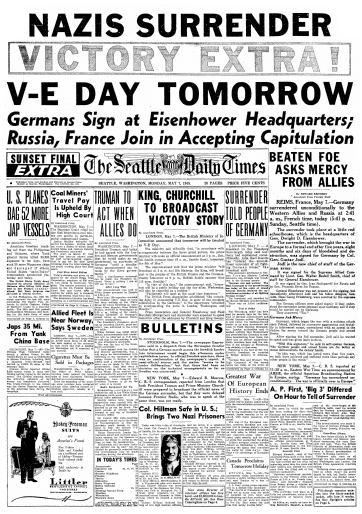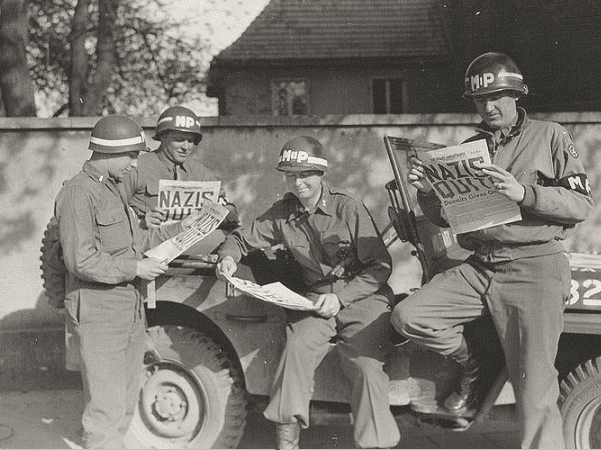The European nightmare of the horror, violence and destruction of World War II lasted 2,076 days, beginning with Germany’s invasion of Poland on 1 September 1939, and ending when Germany unconditionally surrendered to the Western Allies and Russia on 7 May 1945. Tens of millions of soldiers and civilians were killed, and the evil of the Nazi concentration camps was inflicted upon the world – especially the Jewish people.
The European theater of World War II ended with the stroke of German General Alfred Jodl’s pen to the unconditional surrender terms presented to him in a little red schoolhouse in Reims, France, at 2:41 on the morning of 7 May 1945. The surrender was to go into effect the next day, and Europe and America have been celebrating V-E Day (Victory in Europe Day) on May 8 ever since.

The news of the German surrender, of course, dominated the world’s headlines. The following four articles were published by the Seattle Daily Times on the front page of its 7 May 1945 issue:

Here’s the lead story on that front page.
Here is a transcription of this article:
Nazis Surrender
V-E Day Tomorrow
Germans Sign at Eisenhower Headquarters; Russia, France Join in Accepting Capitulation
Beaten Foe Asks Mercy from Allies
By Edward Kennedy, Associated Press Foreign Staff
REIMS, France, May 7. – Germany surrendered unconditionally to the Western Allies and Russia at 2:41 a.m., French time, today (5:41 p.m., Sunday, Seattle time).
The surrender took place at a little red schoolhouse, which is the headquarters of Gen. Dwight D. Eisenhower.
The surrender, which brought the war in Europe to a formal end after five years, eight months and six days of bloodshed and destruction, was signed for Germany by Col. Gen. Gustav Jodl.
Jodl is the new chief of staff of the German army.
It was signed for the Supreme Allied Command by Lieut. Gen. Walter Bedell Smith, chief of staff for General Eisenhower.
It was signed by Gen. Ivan Susloparoff for Russia and by Gen. Francois Sevez for France.
General Eisenhower was not present at the signing, but immediately Jodl and his fellow delegate, Gen. Adm. Hans Georg Friedeburg, were received by the supreme commander.
The German officers were asked sternly if they understood the surrender terms imposed upon Germany and if they would be carried out by Germany.
They answered “Yes.”
Germans Ask Mercy
Germany, which began the war with a ruthless attack upon Poland, followed by successive aggressions and brutality in internment camps, surrendered with an appeal to the victors for mercy toward the German people and armed forces.
After signing the full surrender, Jodl said he wanted to speak and was given leave to do so.
“With this signature,” he said in soft-spoken German, “the German people and armed forces are for better or worse delivered into the victors’ hands. In this war, which has lasted more than five years, we both have achieved and suffered more than perhaps any other people in the world.”
Here is a transcription of this article:
Greatest War of European History Ends
LONDON, May 7. – (AP) – The greatest war in history ended today with the unconditional surrender of Germany.
Joy at the news was tempered only by the realization that the war against Japan remains to be resolved, with many casualties still ahead.
The end of the European warfare, greatest, bloodiest and costliest war in human history – it has caused at least 40,000,000 casualties on both sides in killed, wounded and captured – came after five years, eight months, and six days of strife that overspread the globe.
Hitler’s arrogant armies invaded Poland on September 1, 1939, beginning the agony that convulsed the world for 2,076 days.
Here is a transcription of this article:
Surrender Told People of Germany
By Associated Press.
LONDON, May 7. – A broadcast on the Flensburg wavelength today said Germany had capitulated unconditionally. Adm. Karl Doenitz has “ordered the unconditional surrender of all fighting German troops,” the broadcast said.
This statement attributed to German Foreign Minister Ludwig Schwerin von Krosigk was broadcast to the German people:
“German men and women! The High Command of the armed forces has today at the order of Grand Admiral Doenitz declared the unconditional surrender of all fighting German troops.”
The broadcast was recorded by the British Ministry of Information. There was no Allied confirmation.
Text of Order
The “Flensburg radio” has been used for several days for the issuance of German communiqués and official German orders. Flensburg is just below the German-Danish border in an area surrendered last week to Field Marshal Montgomery. London authorities said it seemed unlikely that Montgomery had permitted the Germans to continue broadcasting from there, but there was no official explanation. Radio monitors here said the station, if not actually at Flensburg, was certainly in that area.
Following is the text of Von Krosigk’s broadcast as recorded by [the] British Ministry of Information:
“German men and women! The High Command of the armed forces has today at the order of Grand Admiral Doenitz declared the unconditional surrender of all fighting German troops.
“As the leading minister of the Reich government which the admiral of the fleet (Doenitz) has appointed for the winding up of all military tasks I turn at this tragic moment of our history to the German nation.
“After a heroic fight of almost six years of incomparable hardness Germany has succumbed to the overwhelming power of her enemies. To continue the war would only mean senseless bloodshed and a futile disintegration.
“A government which has a feeling of responsibility for the future of its nation was compelled to act on the collapse of all physical and material forces and to demand of the enemy the cessation of hostilities.
“It was the noblest tack of [the] admiral of the fleet and of the government supporting him – after the terrible sacrifices which the war demanded – to save in the last phase of the war the lives of a maximum number of fellow countrymen.
“That the war was not ended immediately, simultaneously in the West and in the East, is to be explained by this reason alone.
“We end this gravest hour of the German nation and its Reich.
Bow to German Dead
“In this gravest hour of the German nation and its Reich we bow in deep reverence before the dead of this war.
“Their sacrifices place the highest obligations on us. Our sympathy goes first to our soldiers. It goes out above all to the wounded, the bereaved and to all on whom this struggle has inflicted blows.
“No one must be under any illusions about the severity of the terms to be imposed on the German people by our enemies. We must now face our fate squarely and unquestionably.
“Nobody can be in any doubt that the future will be difficult for each one of us and will exact sacrifices from us in every sphere.
“We must accept this burden and stand loyally by the obligations we have undertaken. But we must not despair and fall into mute resignation. Once again we must set ourselves to stride along the path through the dark future. These are the factors guaranteeing the best state: unity, justice and liberty.
“From the collapse of the past, let us preserve and save one thing – unity, the ideas of the national community, which in the years of war have found their highest expression in the spirit of comradeship at the front and readiness to help one another in all the distress which has inflicted the homeland.
Must Recognize Law
“Shall we retain this unity and not again split up under the stress? (two or three words indistinct) Can we get over the future hard times? We must make right the basis of our nation. In our nation justice shall be the supreme law and the guiding principle.
“We must also recognize law as the basis of all relations between the nations: We must recognize it and respect it from inner conviction.
“Respect for concluded treaties will be as sacred as the aim of our nation to belong to the European family of nations as a member of which we want to mobilize all human moral and material forces in order to heal the dreadful wounds which the war has caused.
“Then we may hope that the atmosphere of hatred which today surrounds Germany all over the world will give place to [a] spirit of reconciliation among the nations, without which the world cannot recover.
“Then we may hope that we again will receive the freedom without which no nation can lead a bearable and dignified existence. Let us devote the future of our nation to the meditation of the innermost and best forces of the German spirit, which has given the world lasting achievements and values.
“To our pride in the heroic struggle of our nation let us link (several words missing) of the Christian Western civilization to make to the honest work of peace a contribution which shall be worthy of the best traditions of our nation.
“May God not leave us in our efforts. May He bless our difficult task.”
At the conclusion the announcer said: “We now will observe three minutes of silence.”
Here is a transcription of this article:
Truman to Act When Allies Do
By Associated Press.
WASHINGTON, May 7. – President Truman said today he had agreed with the London and Moscow governments that he would make no announcement on surrender of Germany “until a simultaneous announcement can be made by the three governments.”
Until a simultaneous statement can be made, the President declared, “there is nothing I can or will say to you.”
After Long Wait
The announcement was read to White House newsmen by Daniels at 2:01 p.m.
More than 100 reporters crowded into Daniels’ office. Most of them had been waiting at the White House for hours following an Associated Press dispatch from Reims, France, received in Washington at 9:35 a.m., telling of the unconditional surrender of Germany’s armed forces at General Eisenhower’s headquarters.
The President’s statement, given out by Jonathan Daniels, press secretary, was addressed to the press and radio.
When Daniels was asked about British announcements that tomorrow will be observed as V-E Day, he said that he had nothing to add to the President’s statement.
This was the text of the President’s statement:
“I have agreed with the London and Moscow governments that I will make no announcement with reference to the surrender of the enemy forces in Europe or elsewhere until a simultaneous statement can be made by the three governments. Until then there is nothing I can or will say to you.”
The White House marked time on a momentarily expected Victory-in-Europe proclamation – but arrangements were complete for President Truman to go on the air when it is issued.
Radio Equipment Set Up
Broadcasting equipment was readied for use in the White House diplomatic room, usual site of presidential radio addresses.
Shortly before noon, boxes of sandwiches were carried into the office of Daniels, indicating no one planned to go out for lunch. The usual parade of official visitors trooped in and out of President Truman’s office.
On Capitol Hill radio-receiving equipment was set up in the House of Representatives so that the members could remain in their seats to hear the historic V-E declaration of the President.
House Democratic Leader McCormack asked and received unanimous consent for the Speaker to declare the House in recess at any time, to hear the proclamation.
McCormack told the body “nothing definite can be said,” but indicated he personally expected that the proclamation may be made sometime during the afternoon.
Note: An online collection of newspapers, such as GenealogyBank’s Historical Newspaper Archives, is not only a great way to learn about the lives of your ancestors – the old newspaper articles also help you understand American history and the times your ancestors lived in, and the news they talked about and read in their local papers. Did any of your family serve in World War II? Please share your stories with us in the comments section.
Related Articles:
- 70th Anniversary of WWII’s D-Day (6 June 1944)
- Little-Known WWII Facts: German POWs in the U.S.
- WWII Victory Gardens: Family History & War Food Rations
